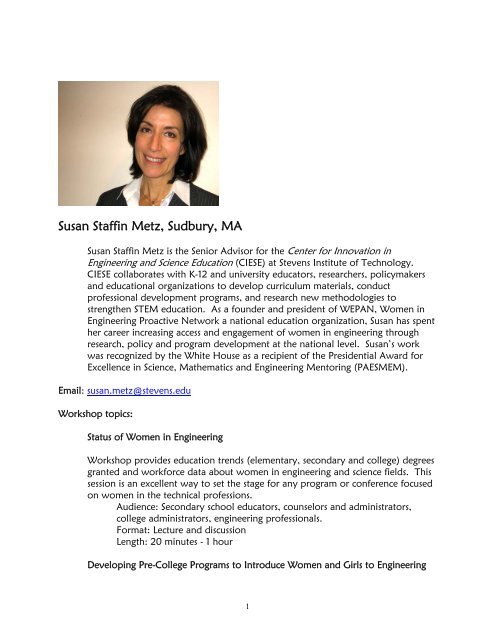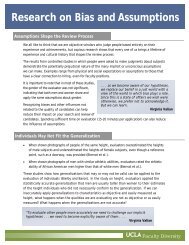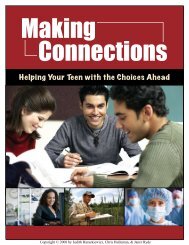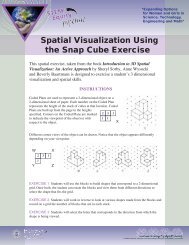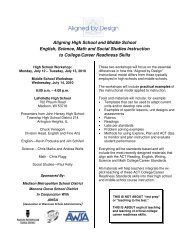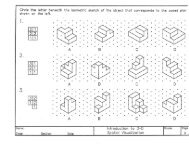portfolio - STEM Equity Pipeline
portfolio - STEM Equity Pipeline
portfolio - STEM Equity Pipeline
You also want an ePaper? Increase the reach of your titles
YUMPU automatically turns print PDFs into web optimized ePapers that Google loves.
Susan Staffin Metz, Sudbury, MA<br />
Susan Staffin Metz is the Senior Advisor for the Center for Innovation in<br />
Engineering and Science Education (CIESE) at Stevens Institute of Technology.<br />
CIESE collaborates with K-12 and university educators, researchers, policymakers<br />
and educational organizations to develop curriculum materials, conduct<br />
professional development programs, and research new methodologies to<br />
strengthen <strong>STEM</strong> education. As a founder and president of WEPAN, Women in<br />
Engineering Proactive Network a national education organization, Susan has spent<br />
her career increasing access and engagement of women in engineering through<br />
research, policy and program development at the national level. Susan’s work<br />
was recognized by the White House as a recipient of the Presidential Award for<br />
Excellence in Science, Mathematics and Engineering Mentoring (PAESMEM).<br />
Email: susan.metz@stevens.edu<br />
Workshop topics:<br />
Status of Women in Engineering<br />
Workshop provides education trends (elementary, secondary and college) degrees<br />
granted and workforce data about women in engineering and science fields. This<br />
session is an excellent way to set the stage for any program or conference focused<br />
on women in the technical professions.<br />
Audience: Secondary school educators, counselors and administrators,<br />
college administrators, engineering professionals.<br />
Format: Lecture and discussion<br />
Length: 20 minutes - 1 hour<br />
Developing Pre-College Programs to Introduce Women and Girls to Engineering<br />
1
This presentation focuses on a variety of program formats to introduce young<br />
women to pursue engineering majors at the college level including: on-site<br />
presentations at secondary schools; one-day campus-based conferences, campusbased<br />
residential summer programs,<br />
Audience: Middle and high school counselors, college faculty and<br />
administrators<br />
Format: Lecture and discussion with a how-to focus<br />
Length: 1 hour<br />
What is Engineering and Why Encourage Student to Consider this Field?<br />
Engineering touches all of our lives in so many ways. Yet few people are wellinformed<br />
about what engineers do. This workshop discusses the contributions<br />
made by engineers, offers succinct examples of the type of work engineers do,<br />
identifies barriers that deter women and minorities from pursuing engineering and<br />
provides strategies to engage these underrepresented groups in the field.<br />
Audience: Guidance counselors, teachers, parents, college administrators<br />
interested who conduct programs to interest more women in engineering<br />
Format: Webinar or Workshop<br />
Length: 1 hour<br />
Dispelling Stereotypes about Engineering<br />
This is a good warm-up exercise to precede a program focused on introducing the<br />
audience to careers in engineering. It raises issues of why women traditionally and<br />
currently lag behind men in their interest in pursuing engineering as a course of<br />
study and career. It begins with a “Startling Statements Quiz” asking the<br />
participants to guess what percent of women are engaged in various careers e.g.<br />
politics, medicine, law, engineering. Following the quiz and discussion of why this<br />
is the case, an interactive session about engineering stereotypes is presented.<br />
Audience: Students, parents, educators, counselors, engineering<br />
professionals, college administrators interested who conduct programs to<br />
interest more women in engineering.<br />
Format: Interactive session<br />
Length: 45 minutes<br />
Selected Publications:<br />
Metz, S.S. (2007). Attracting the Engineering of 2020 Today. In R. Burke and M.<br />
Mattis (Eds.) Women and Minorities in Science, Technology, Engineering and<br />
Mathematics: Upping the Numbers. Edward Elgar Publishing, Northampton, MA.<br />
Metz, S.S. (project director, editor, & author) (2002). Making the Connection<br />
Curriculum: Presenter’s Guide with Karen Samuelsen – a resource for professionals<br />
2
and lay people to introduce engineering to students in grades 3-12, Connections<br />
newsletters, and hands-on engineering based activities with Dr. Martha Cyr, Tufts<br />
University. Funded by Lucent Technologies Foundation. Women in Engineering<br />
Programs & Advocates Network. http://www.wepan.org/events_connection.html<br />
Metz, S.S. (2007). It Takes a Village to Change the Perception of Engineering.<br />
Proceedings of the American Society for Engineering Education.<br />
http://www.asee.org/acPapers/AC%202007Full436.pdf<br />
Brainard, S.G., Metz, S.S., and Gilmore, G. (1999). WEPAN Pilot Climate Survey:<br />
Exploring the Environment for Undergraduate Engineering Students. Proceedings<br />
of the 1999 IEEE/ISTAS Conference on Women and Technology: Historical and<br />
Professional Perspective, pp .61-71.<br />
Metz, S.S. (Ed.and Project Director). (1996). Increasing Access for Women in<br />
Engineering, The Fund for Improvement of Postsecondary Education, U.S.<br />
Department of Education. Grant # P116B41893-95. Stevens Institute of<br />
Technology: Hoboken, N.J.<br />
Metz, S.S. and Bott, K. (1996). Developing Pre-College Programs. In S. S. Metz<br />
(Ed.). Increasing Access for Women in Engineering (pp. 109 - 178). Stevens<br />
Institute of Technology: Hoboken, N.J.<br />
Contracts:<br />
National Academy of Engineering (NAE)<br />
Project Lead the Way (PLTW)<br />
American Association for the Advancement of Science (AAAS) Center for<br />
Advancing<br />
Engineering and Science Capacity,<br />
American Society of Mechanical Engineers (ASME)<br />
National Alliance for Partnerships in <strong>Equity</strong> (NAPE)<br />
Women in Engineering Proactive Network (WEPAN)<br />
College Level Projects<br />
Project to Assess Climate in Engineering: Funded by the Alfred P. Sloan<br />
Foundation and the Engineering Information Foundation<br />
Working with 25 colleges of engineering to better understanding<br />
issues regarding their academic and social environment to improve<br />
retention of undergraduate students, and in particular women and<br />
minorities. Data is obtained through an on-line web-based survey<br />
and on-campus student interviews.<br />
3
Qualifications:<br />
Extension Services in Engineering: Climate, Instruction and Community,<br />
Funded by the National Science Foundation<br />
Working with colleges of engineering to enhance community,<br />
instruction and climate to improve retention of all engineering<br />
students, and in particular women.<br />
WEPAN Training Seminars: Funded by the National Science Foundation,<br />
Alfred P. Sloan Foundation, AT&T Foundation and Fund for the<br />
Improvement of Post-Secondary Education (DOE).<br />
Provided technical assistance to nearly 200, two and four year<br />
engineering colleges to establish or expand programs at the precollege<br />
and college level to improve recruitment and retention of<br />
women in engineering. Created a curriculum to support this effort.<br />
Secondary School Level Projects<br />
Project Lead the Way:<br />
Conducting an extensive review of PLTW curriculum to integrate<br />
equity principles and research into the coursework to attract more<br />
students, particularly women and underrepresented minorities, to<br />
PLTW classes in the US.<br />
Making the Connection: Funded by Lucent Technologies<br />
Created a series of hands-on activities for students in grades 3-12 to<br />
introduce them to engineering; developed a presenter’s guide to<br />
assist engineering professionals and lay people to give effective<br />
presentations about engineering to students in grades 3-12; and<br />
developed compelling newsletters for five educational levels that<br />
include profiles, games, and information about engineering.<br />
http://www.wepan.org/displaycommon.cfm?an=1&subarticlenbr=3<br />
8<br />
Member:<br />
Association for Women in Science Fellow Award<br />
Maria Mitchell Women in Science Award<br />
White House Presidential Award for Excellence in Science, Mathematics and<br />
Engineering Mentoring<br />
Boston University Psychology BA 1976<br />
Seton Hall University Counseling Psychology MA 1978<br />
Women in Engineering Programs & Advocates Network, Inc. (WEPAN)<br />
--Co-founder, Past President, Vice President<br />
4
American Society for Engineering Education (ASEE)<br />
Association for Women in Science (AWIS)<br />
5


